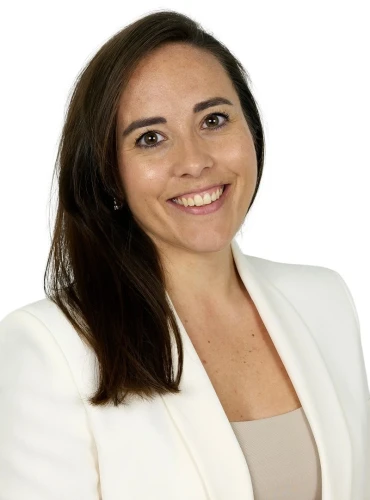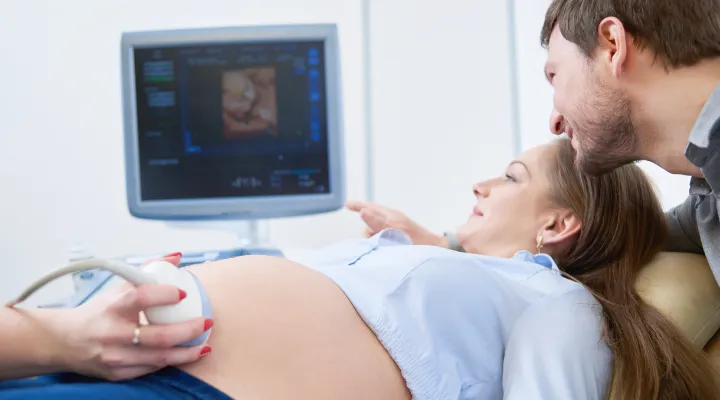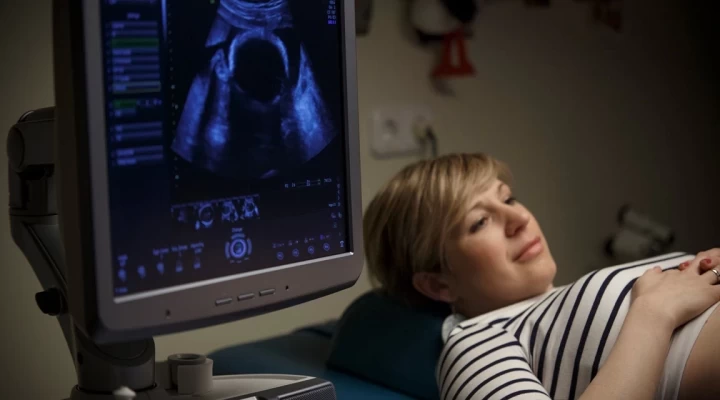Our screening protocol extends to 38 exam areas, enabling us to detect 60% of general developmental disorders and 90% of severe heart defects in the first trimester. With the screening method used, 96-98% of Down syndrome cases can be detected. Results can be made more precise in the second trimester, because as the fetus grows, further parameters can be examined. By the end of the 20th week, 90% of developmental disorders and nearly 100% of severe heart defects can be detected.
The first trimester extended screening test is interactive and informative, and lasts an average of 60 minutes.
The screening test includes:
- Cardiovascular screening
- Combined-extended Down syndrome screening (according to FMF recommendations: MA, NT, NB, TR, DV, FHR, PAPP-A, β-HCG)*
- Full anatomical screening (e.g. brainstem, palate, umbilical cord, fingers)
- Age-based genetic opinion (automatically part of the testing for expectant mothers over 35)
- Optional supplementary test: determination of the risk of developing pre-eclampsia (toxemia of pregnancy) (according to FMF recommendations: UtA-PI, PAPP-A, PLGF, maternal blood pressure in both arms, medical history)
- Measurement of expectant mother’s body mass index (BMI)
- Test for gestational diabetes (GDM), management if necessary
*MA: maternal age, NT: nuchal translucency, NB: nasal bone, TR: tricuspid regurgitation (heart valve exam), DV: ductus venosus (fetal abdominal artery flow exam), FHR: fetal heart rate, PAPP-A, β-HCG: hormones, from blood tests, PLGF: placental growth factor, from blood test, UtA-PI: uterine artery circulation test
More than down syndrome screening
The first trimester extended screening test is the most important pre-natal test. In our center, we give a reliable answer not only to the question of whether the fetus has Down, Edwards, or Patau syndrome, but we look at every disorder that medical science has made it possible to screen for during the 12th week of pregnancy.
Preeclampsia screening
Preeclampsia has always been a source of uncertainty during pregnancy. We do not = know when and why it occurs, and to whom, though we can say who is more likely to contract it. Preeclampsia occurs in 2-5% of pregnancies, and if it develops before the 34th week of pregnancy (0.3-0.5%), there can be very serious consequences for both the mother and child. This is why a new medical procedure which has made it possible to determine the likelihood of developing the condition with 90% accuracy is a huge step forward.
What is preeclampsia?
Preeclampsia is sometimes also referred to as toxemia, pregnancy-induced hypertension or preeclamptic toxemia. It can present itself after the 20th week of pregnancy and can affect any expectant mother, usually without any prior warning. Its symptoms include the sudden development of high blood pressure (140/90 mmHg and above) and the presence of protein in the urine and laboratory abnormalities. The most important danger with regards to preeclampsia is that it can cause serious and long lasting damage to both the mother and baby. It can lead to kidney and liver failure, stroke or eclampsia for the mother, and lack of growth, oxygen deficiency and complications due to premature labor for the baby. According to the latest research, it is possible to reduce the risks of early developing preeclampsia.
For any high risk cases identified during the screening process, a solution for prevention of preeclampsia is offered: Taking 150 mg of aspirin daily between the 14th and 36th week of pregnancy can be effective in preventing the development of early preeclampsia, reducing the chances of it occurring by 80%. Interestingly, a predecessor of aspirin, willow bark, was known and applied by the celebrated Greek doctor Hippocrates.
Because of the high risk of developing preeclampsia, the serious potential consequences and the possibility of evidence-based treatment, a test for preeclampsia is now included in our first trimester screening. (The test is not available if the mother is expecting twins, with the necessary FMF database currently under processing.)
Our related doctors




Any questions before booking an appointment?
If you are unsure which doctor to see or what examination you require, we are here to help!
Simply request a free callback from one of our colleagues, who will help you find the right specialist based on your specific issue.





Reviews